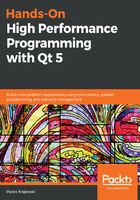
Preface
In today's world, programming knowledge appears to be scattered over a myriad of locations—blog posts, Wikipedia articles, conference presentations, Twitter threads, Stack Overflow questions, and the odd scientific paper to boot. Because of that, I was quite glad when the publishers approached me with an idea for a book about Qt performance—at last, a single place where program performance knowledge could be collected.
This book will try to give you an overview of program performance optimization techniques and apply them in the context of Qt programming. Qt is a cross-platform and cross-topic programming framework encompassing both GUI and system programming on desktop, mobile, and embedded platforms. Hence, while discussing Qt's performance, we will encounter a broad gamut of performance topics of every shade and color, and we will do this not in an abstract manner, but using real-life examples.
Since Qt has many different versions and releases, we will concentrate on the current (as of the time of writing) long-term support (LTS) version, namely, Qt 5.9, but will also provide information regarding later Qt versions up to Qt 5.12. Fitting the high-performance theme, we will mostly be using the epitome of high performance, that is Qt's underlying C++ language, directly.
Moreover, in order to make this book approachable, we will use open source development tools and a very widespread and relatively recent OS platform, namely, Microsoft Windows 10.
I wanted to write a book that I would enjoy reading when I first started to learn about performance years ago—we will start slowly, but then go deep, as I hope to provide you with most of the knowledge required to write performant Qt programs.